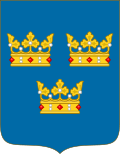Kalmar
Kalmar (/ˈkælmɑːr/, also US: /ˈkɑːlmɑːr/,[2][3] Swedish: [ˈkǎlmar] (![]()
Kalmar | |
|---|---|
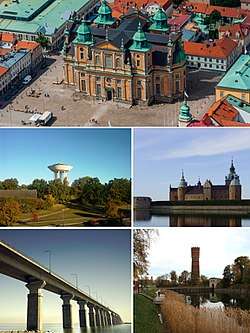 Aerial view of the Kalmar Cathedral, the water tower in Berga, Kalmar Castle, Öland Bridge and the old water tower in central Kalmar. | |
 Coat of arms | |
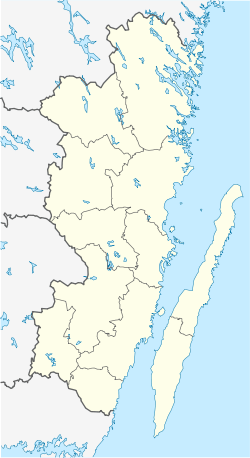 Kalmar 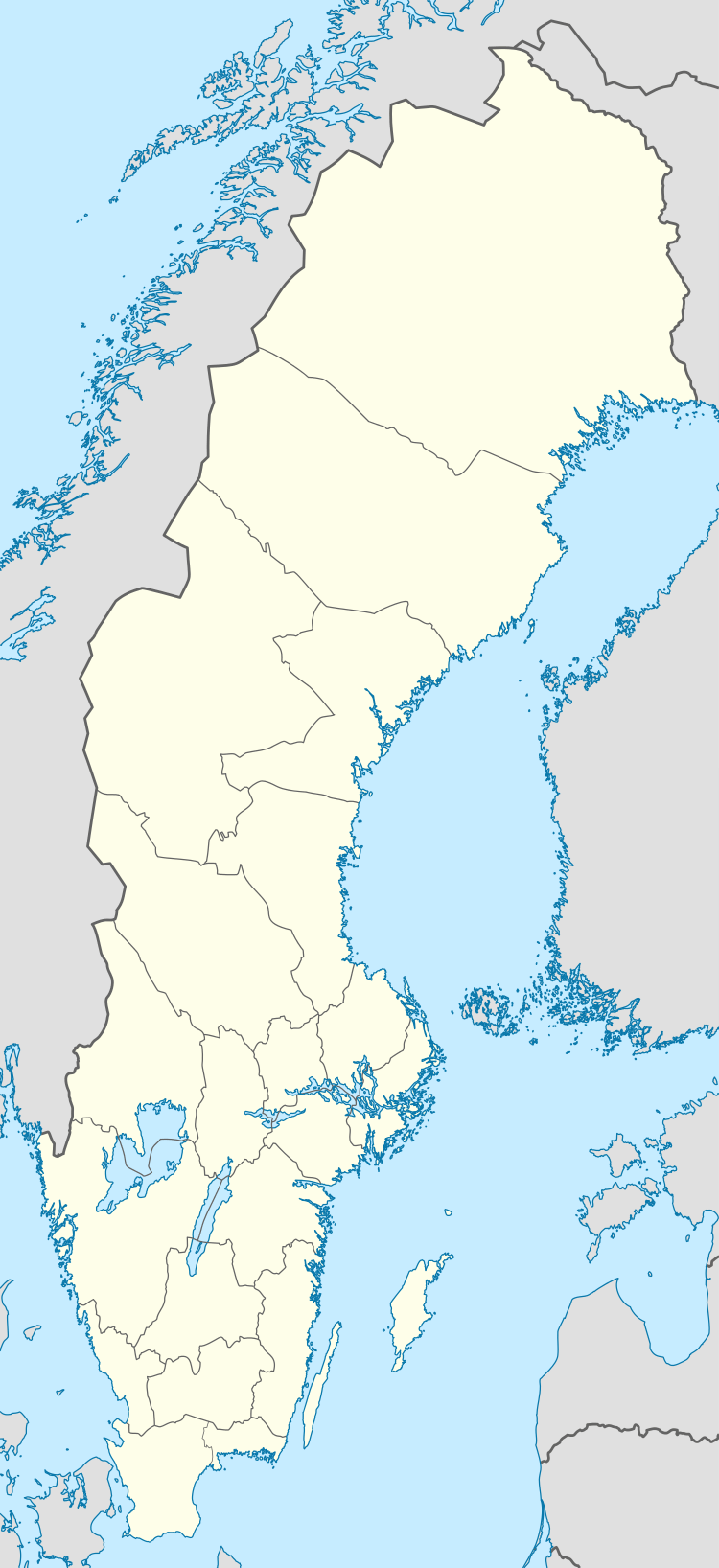 Kalmar | |
| Coordinates: 56°39′41″N 16°21′46″E | |
| Country | Sweden |
| Province | Småland |
| County | Kalmar County |
| Municipality | Kalmar Municipality |
| Charter | 1100 |
| Area | |
| • City | 19.50 km2 (7.53 sq mi) |
| Elevation | 8 m (26 ft) |
| Population (31 December 2010)[1] | |
| • City | 36,392 |
| • Density | 1,866/km2 (4,830/sq mi) |
| • Metro | 61,533 |
| Time zone | UTC+1 (CET) |
| • Summer (DST) | UTC+2 (CEST) |
| Postal code | 39x xx |
| Area code(s) | (+46) 480 |
| Website | kalmar |
From the thirteenth to the seventeenth centuries, Kalmar was one of Sweden's most important cities. Between 1602 and 1913 it was the episcopal see of Kalmar Diocese, with a bishop, and the Kalmar Cathedral from 1702 is an example of classicistic architecture. It became a fortified city, with the Kalmar Castle as the center. After the Treaty of Roskilde in 1658, Kalmar's importance diminished, until the industry sector was initiated in the 19th century. The city is home to parts of Linnaeus University.
Kalmar is adjacent to the main route to the island of Öland over the Öland Bridge.
History
The area around Kalmar has been inhabited since ancient times. Excavations have found traces of Stone Age gravefields. However, the oldest evidence for there being a town is from the 11th century. According to a medieval folk tale, the Norwegian king Saint Olav had his ships moved to Kalmar. The oldest city seal of Kalmar is from somewhere between 1255 and 1267, making it the oldest known city seal in Scandinavia.
In the 12th century the first foundations of a castle were established, with the construction of a round tower for guard and lookout. The tower was continuously expanded in the 13th century, and as such, Queen Margaret called an assembly there between the heads of state of Sweden and Norway, and on 13 July 1397, the Kalmar Union treaty was signed, which would last until 1523. Kalmar's strategic location, near the Danish border (at the time the Scanian lands, i.e. the provinces of Blekinge, Halland and Scania, were part of Denmark), and its harbour and trade, also involved it in several feuds. There are two events independently labelled the Kalmar Bloodbath, 1505: the first in 1505, when King John of Denmark, Norway, and Sweden had the mayor and city council of Kalmar executed; the second in 1599 by command of Duke Charles, later to become King Charles IX of Sweden.

In the 1540s, first King Gustav Vasa, and later his sons Erik XIV of Sweden and John III of Sweden would organize a rebuilding of the castle into the magnificent Renaissance castle it is today.
Kalmar became a diocese in 1603, a position it held until 1915. In 1634, Kalmar County was founded, with Kalmar as the natural capital. In 1660, the Kalmar Cathedral was begun by drawings of Nicodemus Tessin the Elder. It would be inaugurated in 1703.
In 1611–1613, it suffered in the Kalmar War, which began with a Danish siege of Kalmar Castle. 1611 is mentioned as the darkest year of Kalmar's history, but by no means the only dark year; much blood has been shed in the vicinity of the castle. The last was during the Scanian War in the 1670s, so there have been 22 sieges altogether; however the castle was never taken.
After the Treaty of Roskilde in 1658, the strategic importance of Kalmar gradually diminished as the borders were redrawn further south. In 1689, the King established his main naval base further south in Karlskrona and Kalmar lost its status as one of Sweden's main military outposts.
Kalmar Cathedral
The new city of Kalmar was built on Kvarnholmen around the mid-1600s. The transfer from the old town was largely completed by 1658. The new, fortified town was planned following current baroque patterns. Cathedral and town hall face each other across the new main square, Stortorget.
The cathedral was designed by Nicodemus Tessin the Elder and is one of the foremost examples of baroque classicism in Sweden. Its design reflects the complex interaction between the new style, liturgical considerations, tradition and the fortress-city requirements. The work began in 1660, but it was interrupted on several occasions, including when the Scanian War (1675–1679) raged. Construction resumed, and Kalmar Cathedral stood finished in 1703.
Today
In more recent times, Kalmar has been an industrial city with Kalmar Verkstad making steam engines, trains and large machinery, later bought by Bombardier who closed the factory in 2005. A shipyard, Kalmar Varv, was founded in 1679 and closed 1981. Volvo opened their Kalmar factory for building cars i.e. 264, 740, 760, 960 in 1974, but closed it 1994 and due to further relocation of industry jobs in the 1990s and 2000s around 2000 industrial jobs were lost. Kalmar has a university with over 9,000 students and a research facility for Telia Sonera.
Kalmar has embarked on a comprehensive program to reduce fossil fuel use. A local trucking firm, which employs nearly 450 people, has installed computers that track fuel efficiency and have cut diesel use by 10 percent, paying off the cost of the devices in just a year. The company is now looking to fuel its future fleet with biodiesel.[4]
A large wood pulp plant harnesses the steam and hot water it once released as waste to provide heating, through below-ground pipes, and generates enough electricity to power its own operations and 20,000 homes.[4]
Bicycle lanes are common; for example, the Kalmarsundsleden,[5] and cars line up at Kalmar city's public biogas pump. Building codes now require thermal insulation and efficient windows for new construction or retrofits. Street lights use low-energy sodium bulbs, and car dealers promote fuel-efficient and hybrid vehicles.[4]
In 2011 Guldfågeln Arena was initiated. It is the new stadium of the football team of the city, Kalmar FF. The capacity of the stadium is 12,000 people and it is currently one of the newest stadiums in Sweden. The stadium was also built to host concerts and did so in the summer of 2011 when Swedish artists Håkan Hellström and The Ark performed.
Climate
Kalmar has a cold oceanic climate.[6] It is somewhat continental with warm summers and cold winters which normally averages just above the freezing point during days and goes somewhat below it at night. It has some of the hottest temperatures recorded by Swedish cities for most months, with an all-time record of 35.2 °C (95.4 °F).[7] The average summer temperatures however are quite normal for southern Sweden.
| Climate data for Kalmar (2002-2018); precipitation 1961-1990; extremes since 1901 | |||||||||||||
|---|---|---|---|---|---|---|---|---|---|---|---|---|---|
| Month | Jan | Feb | Mar | Apr | May | Jun | Jul | Aug | Sep | Oct | Nov | Dec | Year |
| Record high °C (°F) | 11.6 (52.9) |
15.6 (60.1) |
20.6 (69.1) |
25.7 (78.3) |
32.5 (90.5) |
33.0 (91.4) |
35.2 (95.4) |
33.1 (91.6) |
28.2 (82.8) |
23.5 (74.3) |
15.4 (59.7) |
13.2 (55.8) |
35.2 (95.4) |
| Average high °C (°F) | 2.0 (35.6) |
2.4 (36.3) |
6.2 (43.2) |
11.3 (52.3) |
16.4 (61.5) |
20.4 (68.7) |
22.7 (72.9) |
21.9 (71.4) |
17.9 (64.2) |
11.8 (53.2) |
7.0 (44.6) |
3.7 (38.7) |
12.0 (53.6) |
| Daily mean °C (°F) | −0.6 (30.9) |
−0.5 (31.1) |
2.1 (35.8) |
6.2 (43.2) |
11.3 (52.3) |
15.2 (59.4) |
17.8 (64.0) |
17.0 (62.6) |
13.2 (55.8) |
8.0 (46.4) |
4.5 (40.1) |
1.3 (34.3) |
8.0 (46.4) |
| Average low °C (°F) | −3.5 (25.7) |
−3.5 (25.7) |
−2.0 (28.4) |
1.1 (34.0) |
5.4 (41.7) |
9.4 (48.9) |
12.4 (54.3) |
11.7 (53.1) |
8.5 (47.3) |
4.4 (39.9) |
1.8 (35.2) |
−1.6 (29.1) |
3.7 (38.7) |
| Record low °C (°F) | −31.0 (−23.8) |
−26.5 (−15.7) |
−27.6 (−17.7) |
−12.7 (9.1) |
−5.8 (21.6) |
−1.2 (29.8) |
2.6 (36.7) |
0.4 (32.7) |
−5.7 (21.7) |
−8.8 (16.2) |
−17.3 (0.9) |
−25.3 (−13.5) |
−31.0 (−23.8) |
| Average precipitation mm (inches) | 37.0 (1.46) |
28.9 (1.14) |
29.5 (1.16) |
29.0 (1.14) |
34.7 (1.37) |
38.9 (1.53) |
59.5 (2.34) |
49.5 (1.95) |
50.1 (1.97) |
38.5 (1.52) |
46.5 (1.83) |
41.2 (1.62) |
484.0 (19.06) |
| Source 1: SMHI[8] | |||||||||||||
| Source 2: SMHI Monthly Data 2002-2018[9] | |||||||||||||
Gallery
History
.png) The seal of Kalmar, 13th century
The seal of Kalmar, 13th century Engraving from Suecia antiqua et hodierna, circa 1700
Engraving from Suecia antiqua et hodierna, circa 1700 Town plan, 1906
Town plan, 1906
Main sights
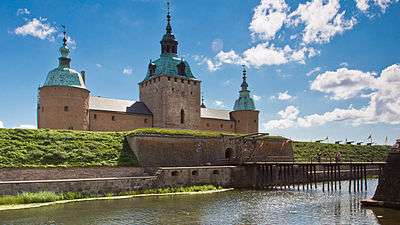
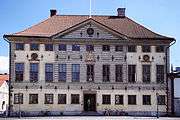 Town hall
Town hall In 1972, the 6 km (4 mi) long Öland bridge was built from Kalmar to the town of Färjestaden on Öland
In 1972, the 6 km (4 mi) long Öland bridge was built from Kalmar to the town of Färjestaden on Öland- Kalmar County Museum
General views
- Main square
- Houses on the main square
 Street in Kalmar
Street in Kalmar- Square in Kalmar
- Scenic photograph of Kalmar Castle in the summer sun
 Mermaid sculpture Kalmar
Mermaid sculpture Kalmar
Sports
The following sports clubs are located in Kalmar:
- Kalmar FF
- Lindsdals IF
- Kalmar AIK
- IFK Berga
- Kalmar Södra IF
Notable people
- Mikael Adolphson – historian
- Charlotta Djurström – theatre director
- Helena Josefsson – musician, lead singer in Sandy Mouche
- Ivar Kreuger – civil engineer and industrialist
- Jangir Maddadi – designer living in Kalmar
- Carl Gustaf Mosander – chemist who discovered lanthanum, erbium, terbium
- Jenny Nyström – painter and illustrator
- Henrik Strindberg – composer
- Hans Villius – historian
Twin towns – sister cities
Kalmar is twinned with eleven cities:[10]











See also
- Kalmar Municipality
- Kalmar Airport
- Kalmar Verkstad
- Spawn of Possession
- Linnaeus University
- Kalmar Nyckel, historical ship named after the city of Kalmar
- Kalmar FF, premier division football club from the city
- Ragnarök
Notes
- "Tätorternas landareal, folkmängd och invånare per km2 2005 och 2010" (in Swedish). Statistics Sweden. 14 December 2011. Archived from the original on 10 January 2012. Retrieved 10 January 2012.
- "Kalmar" (US) and "Kalmar". Oxford Dictionaries UK Dictionary. Oxford University Press. Retrieved 31 January 2019.
- "Kalmar". Merriam-Webster Dictionary. Retrieved 31 January 2019.
- Going green: Entire Swedish city switches to biofuels to become environmentally friendly Archived 6 March 2009 at the Wayback Machine
- "Archived copy" (PDF). Archived from the original (PDF) on 20 September 2013. Retrieved 12 April 2013.CS1 maint: archived copy as title (link)
- "Kalmar, Sweden Climate Summary". Weatherbase. Retrieved 21 April 2015.
- "Monthly Weather Data - July 2014 (all-time records section)" (PDF). SMHI. Retrieved 21 April 2015.
- "Precipitation Normals 1961-1990" (in Swedish). Swedish Metereological and Hydrological Institute (Kalmar code 6641). Archived from the original on 28 September 2018. Retrieved 20 April 2015.
- "Yearly and Monthly Statistics" (in Swedish). SMHI. 14 April 2017.
- "Våra vänorter". kalmar.se. Archived from the original on 27 April 2014. Retrieved 27 April 2014.
References
- (in Swedish) Article Kalmar, Nordisk familjebok, Kalmar domkyrkas historia
External links
| Wikimedia Commons has media related to Kalmar. |
| Wikivoyage has a travel guide for Kalmar. |
- Kalmar Municipality – Official site
- iKalmar – a social network for citizens of Kalmar
- Kalmar Castle
- Kalmar City – pictures from nightlife in Kalmar
- University of Kalmar
- Barometern Oskarshamns-Tidningen – daily newspaper from Kalmar and Oskarshamn
